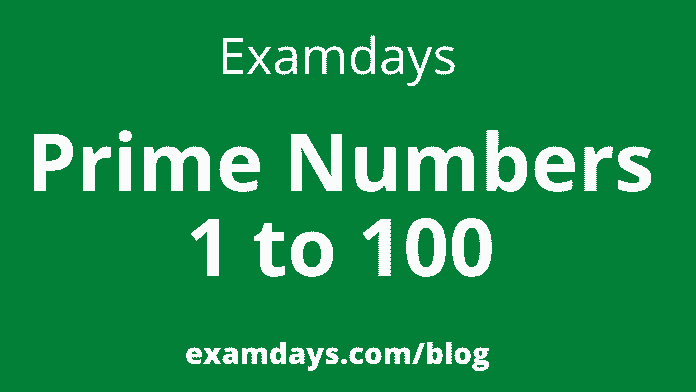Prime numbers 1 to 100: Are you looking for the prime numbers from 1 to 100, looking for the best method to find rhe prime number? In this page, we will show you how to find the prime numbers in less a minute.
For Prime numbers 1 to 100, the details are listed out for the candidate’s reference purpose. Check the page for more information and further details.
Prime numbers 1 to 100
What is a prime number?
Prime numbers are the numbers that are not divisible by another number except one and the number itself. Some prime numbers are 2,3,5,7,11,13,17 etc., and 2 is the only prime number for additional information.
A prime number is any natural number greater than one with no positive integer divisors other than one. For example, Five has no positive divisors other than 1 and 5. Hence, it is a prime number.
Zero is neither prime nor composite. Since zero is the number of numbers equal to zero, the product of zero has an infinite number of factors.
twin prime numbers 1 to 100
- Two is the first prime number and only even prime number.
- A negative integer is not prime because some negative integers are factors, for example, -x, -x, x, and 1, so it is non-prime.
- There are many primes of the form p and p+2, where p is a prime number.
- The form (n^2)+1 has many prime numbers.
- The most significant prime number ever discovered, 2^(57,885,161 )− 1 and has 17,425,170 digits!! Awesome, right!?
- Every even positive integer can be written as the sum of 2 primes.
Here is a table of all prime numbers 1 to 100:
There are twenty five prime numbers from 1 to 100.
| 2 | 3 | 5 | 7 | 11 | 13 | 17 | 19 | 23 | |
| 29 | 31 | 37 | 41 | 43 | 47 | 53 | 59 | 61 | 67 |
| 71 | 73 | 79 | 83 | 89 | 97 |
If you want to prove whether a number is prime or not, first divide it by the number two and see if you get a whole number. If you do, it shouldn’t be a prime number. If you don’t get a whole number, try dividing it by prime numbers: 3, 5, 7, 11 and so on, always dividing by the prime number (see table below).
Some features of prime numbers:
- Prime numbers are the natural numbers in which are greater than one that has only two factors, one and the number itself.
- A number can be a prime number if it is a non-zero whole number.
- Prime factorization is a method to find prime numbers.
- After 2, every prime number is an odd number.
- A prime number ’n’ is not divisible from 2 to ‘n-1′
- Any number multiplied with its smaller number (upto 2) is not a prime number. For example, 7*5 = 35, not a prime number. 7*3 = 21, not a prime number
- From 15, numbers ending with 5 are not prime numbers.
- From 10, numbers ending with 2,4,5,6,8,0 are not prime, so the probability of prime numbers between any ten numbers is 0.4 (40%)
- One is not a prime number. Also, one is not used to determine the prime number as it is divisible by any number.
- An efficient way to determine the prime number ’n’ is to check it from 2 to ‘(n-1)/2’, not 2 to ‘n-1′. For example, 97 is a prime number. Determine it from 2 to 48, not 2 to 96. As 48*2 = 96. So there’s no need to check it further from 49 to 96
All the prime numbers between 1 to 1000:
Showing all the prime numbers between 1 to 1,000 in below table
| 2 | 3 | 5 | 7 | 11 | 13 | 17 | 19 | 23 | |
| 29 | 31 | 37 | 41 | 43 | 47 | 53 | 59 | 61 | 67 |
| 71 | 73 | 79 | 83 | 89 | 97 | 101 | 103 | 107 | 109 |
| 113 | 127 | 131 | 137 | 139 | 149 | 151 | 157 | 163 | 167 |
| 173 | 179 | 181 | 191 | 193 | 197 | 199 | 211 | 223 | 227 |
| 229 | 233 | 239 | 241 | 251 | 257 | 263 | 269 | 271 | 277 |
| 281 | 283 | 293 | 307 | 311 | 313 | 317 | 331 | 337 | 347 |
| 349 | 353 | 359 | 367 | 373 | 379 | 383 | 389 | 397 | 401 |
| 409 | 419 | 421 | 431 | 433 | 439 | 443 | 449 | 457 | 461 |
| 463 | 467 | 479 | 487 | 491 | 499 | 503 | 509 | 521 | 523 |
| 541 | 547 | 557 | 563 | 569 | 571 | 577 | 587 | 593 | 599 |
| 601 | 607 | 613 | 617 | 619 | 631 | 641 | 643 | 647 | 653 |
| 659 | 661 | 673 | 677 | 683 | 691 | 701 | 709 | 719 | 727 |
| 733 | 739 | 743 | 751 | 757 | 761 | 769 | 773 | 787 | 797 |
| 809 | 811 | 821 | 823 | 827 | 829 | 839 | 853 | 857 | 859 |
| 863 | 877 | 881 | 883 | 887 | 907 | 911 | 919 | 929 | 937 |
| 941 | 947 | 953 | 967 | 971 | 977 | 983 | 991 | 997 |
Are zero and one prime?
The number 1 has positive divisors of 1 and itself and must have 2 positive factors. Now, for the number 1, the number of positive factors is only one, i.e., one only. Therefore, number one is not a prime number, and one is also not a composite number. So, both 0 and 1 are not prime numbers.
Conclusion:
Prime numbers are numbers in which are not divisible by any number other than 1 and that number. Some prime numbers are 2,3,5,7,11,13,17 etc. and additional information 2 is the only even prime number.
Examdays Article Agenda


